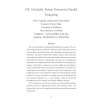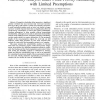790 search results - page 4 / 158 » Limits of Work-Stealing Scheduling |
SP
2002
IEEE
13 years 10 months ago
2002
IEEE
CX, a network-based computational exchange, is presented. The system's design integrates variations of ideas from other researchers, such as work stealing, non-blocking tasks...
LCTRTS
1998
Springer
14 years 3 months ago
1998
Springer
Instruction scheduling is a necessary step in compiling for many modern microprocessors. Traditionally, global instruction scheduling techniques have outperformed local techniques....
CF
2009
ACM
14 years 5 months ago
2009
ACM
Resource management on accelerator based systems is complicated by the disjoint nature of the main CPU and accelerator, which involves separate memory hierarhcies, different degr...
SPAA
2010
ACM
14 years 3 months ago
2010
ACM
We explore the potential of hardware transactional memory (HTM) to improve concurrent algorithms. We illustrate a number of use cases in which HTM enables significantly simpler c...
RTS
2011
13 years 5 months ago
2011
—Preemptive scheduling often generates a significant runtime overhead that may increase task worst-case execution times up to 40%, with respect to a fully non preemptive executi...


